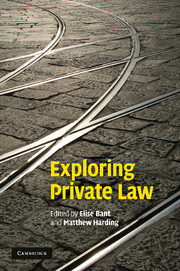Book contents
- Frontmatter
- Contents
- List of Contributors
- Foreword
- Acknowledgments
- Table of Cases
- Table of Legislation
- Introduction
- I Method
- II Unjust enrichment
- III Equity and trusts
- 11 What is left of equity's relief against forfeiture?
- 12 Contracts, fiduciaries and the primacy of the deal
- 13 Four fiduciary puzzles
- 14 Good faith: what does it mean for fiduciaries, and what does it tell us about them?
- 15 Trustees' duties to provide information
- IV Remedies
- Index
- References
13 - Four fiduciary puzzles
Published online by Cambridge University Press: 10 November 2010
- Frontmatter
- Contents
- List of Contributors
- Foreword
- Acknowledgments
- Table of Cases
- Table of Legislation
- Introduction
- I Method
- II Unjust enrichment
- III Equity and trusts
- 11 What is left of equity's relief against forfeiture?
- 12 Contracts, fiduciaries and the primacy of the deal
- 13 Four fiduciary puzzles
- 14 Good faith: what does it mean for fiduciaries, and what does it tell us about them?
- 15 Trustees' duties to provide information
- IV Remedies
- Index
- References
Summary
A hundred years ago Fletcher Moulton LJ said of fiduciary duties that ‘[t]here is no class of case in which one ought more carefully to bear in mind the facts of the case’. In the last century nothing has changed to alter the force of this dictum. However, the development of fiduciary duties in England has shown why they are so dependent upon the facts of the case. This is because of their nature as terms which are expressed or implied into voluntary undertakings. The constraints of space in this chapter preclude an explanation of this thesis. I have given that explanation, from a doctrinal perspective, in a longer article elsewhere. The same conclusion, from a contextual ‘contractarian’ approach, is also reached in Tony Duggan's chapter in this volume.
This chapter takes that premiss – that fiduciary duties are voluntary undertakings – as its starting point and shows how such an analysis helps to understand and provide answers to four contemporary puzzles in the law concerning fiduciary obligations. The four puzzles are as follows:
(1) Which fiduciary duties can be excluded by agreement?
(2) When do fiduciary obligations come to an end?
(3) What is the proper law to be applied to fiduciary duties where they arise in a cross-border context?
(4) What is the level of fault required before a person can be liable for inducing or assisting in a breach of fiduciary duty?
- Type
- Chapter
- Information
- Exploring Private Law , pp. 298 - 318Publisher: Cambridge University PressPrint publication year: 2010
References
- 1
- Cited by



